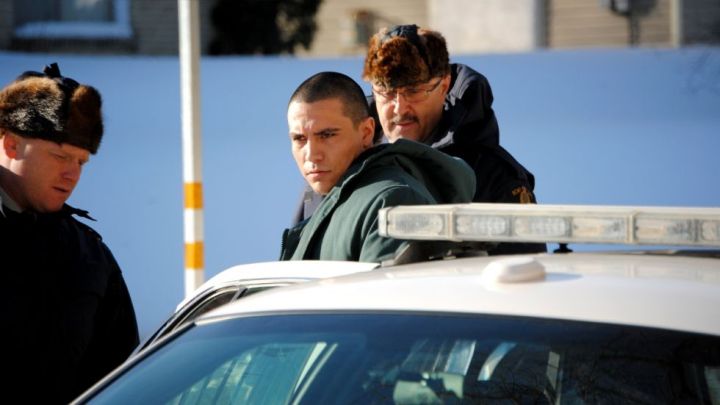A shortage of judges and legal aid funding is “choking” Alberta’s court system, a defence lawyer said after a judge threw out a first-degree murder case because it took too long to get to trial.

READ MORE: 3 Alberta sex assault cases rescheduled for 2017 due to judge shortage
In a surprise ruling obtained by Global News, Lance Matthew Regan had his charge of first-degree murder stayed on Friday, Oct. 7.
In the ruling, Justice S.D. Hillier said Regan’s right to be tried within a “reasonable time” was violated. He was accused in the stabbing death of Mason Tex Montgrand, 21, a fellow inmate at Edmonton Institution, on Aug. 16, 2011.

Defence lawyer Graham Johnson attributes the court delays in Alberta to a judge shortage and a lack of legal aid funding.
As a result, the provincial court is overbooking, he said.
“So it’s a bit like how the airlines will oversell a flight and gamble that there’s going to be a certain number of no-shows so they’re going to be OK. The provincial court will overbook trials, gambling on a certain number of cases settling at the last minute.”
“The system is on the verge of choking on itself.”
READ MORE: Court doc says shortage leaves Alberta judges ‘without requisite time’ for cases
Regan’s case was scheduled to go to trial beginning Oct. 17, 2016.
READ MORE: Edmonton inmates were forced into prison fight club, lawsuit alleges
The original application brought forward by his lawyer Tonia Grace pointed to a lapse between the initial charge and the expected conclusion of trial, calculated at 62.5 months.
“In this particular case, Mr. Regan had been subjected to a lot of delay beyond his control,” Grace said. “And ultimately the court decided that that was too much delay and that his right to a fair trial within a reasonable period had been breached under the Charter of Rights and Freedoms.”
“This isn’t an acceptable period of time for someone to wait looking at a life sentence if convicted.… They are deserving, like anybody, of a speedy, just trial. And for Mr. Regan to wait over five years for his trial was beyond unreasonable.”
Hillier cited the landmark Supreme Court of Canada ruling R. vs Jordan, which set out a new framework for determining whether a criminal trial has been unreasonably delayed.
According to the framework, an unreasonable delay would be presumed should proceedings — from the date of charge to conclusion of a trial — exceed 18 months in provincial court, or 30 months in superior court.
The R. vs Jordan ruling also notes there can be exceptional circumstances in “particularly complex” cases that would allow for an exception.
READ MORE: Travis Vader’s lawyer says Alberta murder case thrown out over delays sets precedent
But in Hillier’s ruling, he concludes the Regan case did not qualify as “exceptional” and ruled Regan’s charter right had been violated. The Crown has 30 days to appeal.
A similar application has also been made in the Calgary case of three people convicted in the November 2013 swarming death of Lukas Strasser-Hird who have yet to be sentenced.
In June, a jury found Assmar Shlah and Franz Cabrera guilty of second-degree murder. The jury found Joch Pouk guilty of manslaughter. Shlah and Cabrera face automatic life sentences with no chance of parole for at least 10 years.
The defence teams in the Calgary case also argue there’s been an unreasonable delay.
The victim’s father, Dale Hird, says the process is exhausting.
“The people that stabbed and stomped my son to death–they have a chance to go free–and it’s an outrage,” Hird said.
Hird is worried the Regan ruling could add to the precedent cases defence will present in his son’s case.
“We really don’t understand how this is a possibility and I don’t think the public even really knows that these kinds of things can happen–and hopefully they will now,” he added.
READ MORE: Judge shortage means some trials taking 2.5 years to be heard
Johnson argued one of three cases—along with the Jordan ruling—that came out of the Supreme Court of Canada this year on the issue of unreasonable delay.
“What the courts say…is that over time, witnesses’ memories fail, evidence gets lost, and the Supreme Court made it very clear that public interest is best served by having charges tried on their merits in a timely fashion,” Johnson said.
“No one benefits in the system from undue delay.”
Johnson said any delay that’s directly the fault of the defence team is deducted from the total time, so it’s not the case that defendants can make “procedural manoeuvres” designed to extend the time.
Johnson said he had a case within the last month that was ready to go to trial in which the accused was in custody and two civilian witnesses took time off work to be there.
“We were told that morning: ‘sorry there’s no judge available to hear this case. You have to get an adjournment.'”
Conservative Deputy Justice Critic Michael Cooper said the minister of justice hasn’t taken filling judicial vacancies seriously.
“It’s absolutely essential that the federal government get out in front right now,” Cooper said. “Otherwise there is a risk of thousands of cases being thrown out of court as a result of the Jordan decision.”





Comments